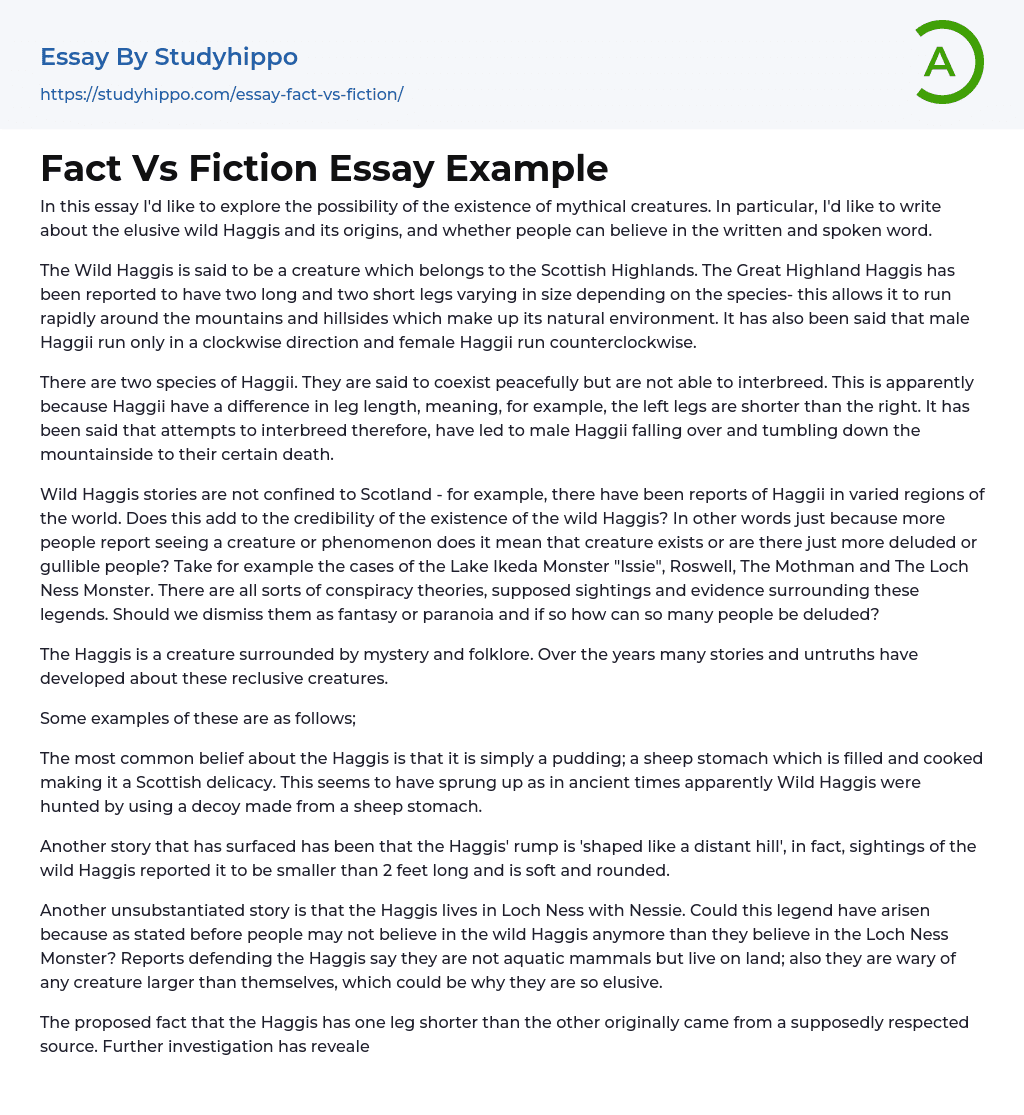In this essay I'd like to explore the possibility of the existence of mythical creatures. In particular, I'd like to write about the elusive wild Haggis and its origins, and whether people can believe in the written and spoken word.
The Wild Haggis is said to be a creature which belongs to the Scottish Highlands. The Great Highland Haggis has been reported to have two long and two short legs varying in size depending on the species- this allows it to run rapidly around the mountains and hillsides which make up its natural environment. It has also been said that male Haggii run only in a clockwise direction and female Haggii run counterclockwise.
There are two species of Haggii. They are said to coexist peacefully but are not able to interbreed. This is apparently because Haggii have a difference in
...leg length, meaning, for example, the left legs are shorter than the right. It has been said that attempts to interbreed therefore, have led to male Haggii falling over and tumbling down the mountainside to their certain death.
Wild Haggis stories are not confined to Scotland - for example, there have been reports of Haggii in varied regions of the world. Does this add to the credibility of the existence of the wild Haggis? In other words just because more people report seeing a creature or phenomenon does it mean that creature exists or are there just more deluded or gullible people? Take for example the cases of the Lake Ikeda Monster "Issie", Roswell, The Mothman and The Loch Ness Monster. There are all sorts of conspiracy theories, supposed sightings and evidence surrounding these legends. Should we dismis
them as fantasy or paranoia and if so how can so many people be deluded?
The Haggis is a creature surrounded by mystery and folklore. Over the years many stories and untruths have developed about these reclusive creatures.
Some examples of these are as follows;
The most common belief about the Haggis is that it is simply a pudding; a sheep stomach which is filled and cooked making it a Scottish delicacy. This seems to have sprung up as in ancient times apparently Wild Haggis were hunted by using a decoy made from a sheep stomach.
Another story that has surfaced has been that the Haggis' rump is 'shaped like a distant hill', in fact, sightings of the wild Haggis reported it to be smaller than 2 feet long and is soft and rounded.
Another unsubstantiated story is that the Haggis lives in Loch Ness with Nessie. Could this legend have arisen because as stated before people may not believe in the wild Haggis anymore than they believe in the Loch Ness Monster? Reports defending the Haggis say they are not aquatic mammals but live on land; also they are wary of any creature larger than themselves, which could be why they are so elusive.
The proposed fact that the Haggis has one leg shorter than the other originally came from a supposedly respected source. Further investigation has revealed the legs should all be the same size, it is a guess that they may look uneven due to the Haggis standing in bogs to confuse predators -why- we don't know, but it would be unlikely to stop a predator as the Haggis could not run from a bog!
My personal opinion of
the wild Haggis' existence is that although there is no concrete evidence, I am open to believe that the creature may exist and may become a frequent subject of our views and stories.
My personal opinion of whether we can believe in myths and all we read is that although many things may seem strange people should always read between the lines to make sure they understand the subject before dismissing it as fiction.
In final I would like to propose the creation of a foundation called "Save the Haggis". I have suggested it be listed just ahead of the "Save the Whales" foundation on the National Registry. After all, there are a lot more whales out there than there are Haggii.
At the end of this essay I'd like to include a famous Robert Burns poem titled An Ode to the Haggis. This reflects the belief of the pudding shaped Haggis.
- Allegory essays
- Alliteration essays
- Comedy essays
- Comic book essays
- Drama essays
- Dystopia essays
- Fairy Tale essays
- Fantasy essays
- Fiction essays
- Ghost essays
- Gothic Fiction essays
- Gothic Literature essays
- Irony essays
- Legend essays
- Memoir essays
- Novel essays
- Poetry essays
- Satire essays
- Science Fiction essays
- Short Story essays
- The western essays
- Tragedy essays
- Witchcraft essays




